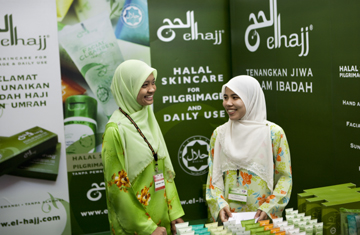
FRESH LOOK: Malaysia-based El Hajj markets skincare products such as moisturizer and facial cleanser to pilgrims headed to Mecca
(2 of 3)
Going Mainstream
Today, though, the big business is in working out how to serve the increasingly sophisticated Muslim consumer. "The question now for companies is: What products and services are you going to provide to help Muslims lead the lifestyle they want to lead?" asks the Halal Journal's Abdullah. It's a code worth cracking. A 2007 report from the global ad agency JWT describes the Muslim market thus: "It's young, it's big, and it's getting bigger." Parts of it are well-educated and wealthy. The buying power of American Muslims alone is estimated at a hefty $170 billion annually. But with few exceptions, American marketers ignore them, says Ann Mack, JWT's director of trendspotting. "Muslims don't feel that brands are speaking to them," she says. "When we did the study, it was very difficult to find mainstream companies that were making significant programs geared toward the Muslim population."
That's less of a problem elsewhere. Indeed, the most innovative new halal products and services often come out of Europe and Southeast Asia, places where your average food supplier or bank may know little, if anything, about halal. In Europe — the biggest growth region according to the Halal Journal — young devout Muslims are hungry for Islamic versions of mainstream pleasures such as fast food. "The second- and third-generation Muslims are fed up with having rice and lentils every day," observes Darhim Hashim, CEO of the Malaysia-based International Halal Integrity Alliance. "They're saying, 'We want pizzas, we want Big Macs.' " Domino's now sources halal pepperoni from a Malaysian company for the pizzas it sells from Kuala Lumpur to Birmingham; KFC is testing halal-only stores in Muslim areas of the U.K., and the Subway sandwich chain has halal franchises across Britain and Ireland. (See pictures: "The Hajj Goes High-Tech".)
Swiss food giant Nestlé is a pioneer in the field. It set up its halal committee way back in the 1980s, and has long had facilities to keep its halal and non-halal products separated. Turnover in halal products was $3.6 billion last year, and 75 of the company's 456 factories are geared for halal production.
For non-food companies like South Korea's LG and Finnish cell-phone giant Nokia, targeting Muslims is also big business. LG offers an application to help users find the direction of Mecca, while Nokia has free downloadable recitations from the Koran and maps showing the locations of major mosques in the Middle East. Such offerings increase brand loyalty, according to market research by the Finland-based Muslim lifestyle portal Muxlim.com. "There's a lot of room out there for mainstream brands to appeal to Muslims without making changes to their products," says Muxlim.com's CEO Mohamed El-Fatatry. "It's just about their marketing messages, about showing that this brand is interested in them as consumers."
It's also about understanding the nuances. The hypermarket run by French supermarket giant Carrefour at the Mid Valley Megamall in Kuala Lumpur is overwhelmingly halal, with an elaborate system to keep halal foods separate from the haram ones. Goods that divide scholars on whether they're halal or haram because they could have trace elements of wine — Balsamic vinegar, say, or Kikkoman Marinade — get slapped with little green stickers to alert customers. More blatantly haram items are confined to La Cave, a glassed-in room at the back of the store for goods containing alcohol, pork or tobacco. Wearing special blue gloves, La Cave's staff handle haram goods and seal them in airtight pink plastic wrapping after purchase, so as not to contaminate the main store. "I'm so scared," said Norini Razak, a 23-year-old regular Carrefour shopper in a grey-and-white hijab. "It's difficult for one to know what is halal and what is not, so I'd prefer to go to a shop with labels [to help me]."
